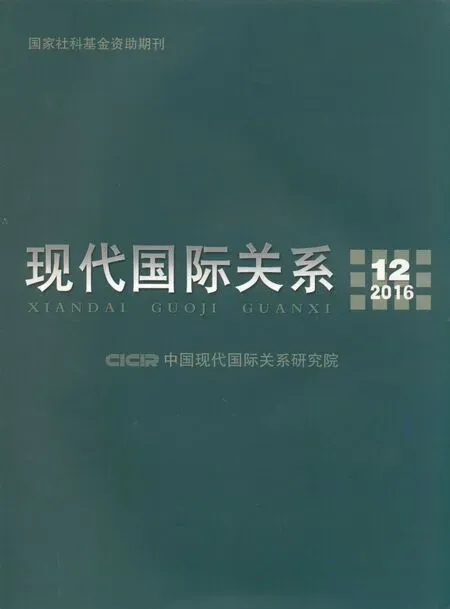Abstracts
s
The Evolution of Modern International Order and China’s Responsibility of the Times
WangHonggang
Abstract: A series of principles of equal sovereignty, interest first, international rule of law, led by major powers, respect of human rights constitute the basis of thought of modern international order and have not changed but become more deep-rooted over the competition and cooperation among countries over the past several centuries. And the modern international order is also developing through this process. Today, the evolution of modern international order is at a critical moment. There must be new thought, new ideas and new impetus to push the new round of modernization of international order. The inherent national character, historical orientation and future potential of development of China make it sure that China has the capability to be the backbone power of the new round of modernization of international order for the coming decades. China should be fully aware of this historic opportunity and responsibility of times and make special contribution to the new round of modernization of international order.
Modern international order, evolution, China’s great rejuvenation, responsibility of times
The Forward -Looking of Trump’s China Policy
WangDong&SunBingyan
Abstract: With the dramatic result of American Election coming out, Donald Trump won the presidency at last. Trump’s speeches and words about China in this election have reflected the American public’s anger toward US-China Trade. So how the anti-establishment based Trump will deal with China with his so many rhetoric of criticismagainst China? At present, Trump, his foreign policy team and the Republican mainstream are going to be very tough on dealing with US-China Trade issues; Trump is more inclined to isolationism and unilateralism for military development and national security issues.The U.S. will enhance and reinforce its military deployment in the WesternPacific aiming at restraining China. There could be more uncertainties in the future bilateral hot issues, including issues such as Taiwan and the South China Sea.From the point of view of Trump’s pragmatismand unpredictable decision-making style, China should throw away the overly optimistic delusion about Trump and prepare the incoming shock wave inChina-US relations. But also, China should insist the “Strive for the best, fear no worst” rule and take a much more proactive approach for dealing with the Trump administration, re-negotiate with him concerningChina-U.S.cooperationas well asdivergences, and stabilize and improve China-US relation in the next four years.
Keywords: Trump, China-US trade, Perceptions, Sino-US relation
US Deterrence and Coercive Diplomacy toward China and China’s Response
ZhangWenzong
Abstract: Deterrence and coercion are two different strategies, while the later is a more aggressive approach. The U.S. Asia-Pacific rebalance strategy is one of the most important diplomatic legacies for the Obama Administration. On issues of Diaoyu Islands, South China Sea, cyber security, DPRK and Iran, U.S. carried out military deterrence and non-military coercion against China. Generally speaking, these kinds of strategies were light compulsion, different from harsh economic sanctions and diplomatic isolation imposed on Russia, Syria, DPRK and Iran. China and U.S. lacked the room to maneuver in the future on some significant differences. China could actively respond if US escalates its deterrence and coercion, but it would be difficult for both countries to construct the new model of major country relations.
Keywords: U.S., Asia-Pacific Rebalance Strategy , Deterrence, Coercion
The Adjustment of Duterte Government’s Policy toward China and its Influence
ZhangYuquan&HongXiaowen
Abstract:The newly elected president of Philippine, Duterte, is adjusting the country’s foreign policy towardsChinaafter taking the position. In the next several years, Philippine’sChinapolicy is likely to be more modest and independent, in order to pursue a hedging strategy of enhancing security alliance with theU.S.while engagingChinaeconomically and politically. The adjustment is attributed to the current dilemma of Sino-Philippine relation, as well as the requirement of fighting against those terrorist organizations in the south and developing domestic economics. Apparently, the policy will be a reflection of Duterte’s pragmatism theory in diplomacy. In consequence, great influence is about to generate on the South ?China Sea dispute and change of relations among regional powers.
Keywords: Duterte, US-Philippine alliance, China-Philippine relations, South China Sea dispute
Eu’s Crackdown on Multinational Corporations’ Tax Evasion
ZhangJun
Abstract: In the process of globalisation, the European countries have been deeply integrated into the global value chains,nonetheless, they have to tackle the negativesocial impacts caused by the expanding global market. In general, the EU is inclined to promote global governance, to strengthen international cooperation vis-à-vis key policy issues and to enhance market regulation at a global level. This inclination is clearly demonstrated by the EU’s policy on tax evasion of multinationals.
Keywords: Globalization, EU, Tax evasion
(Edited by Wang Wenfeng)

